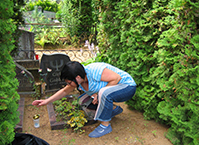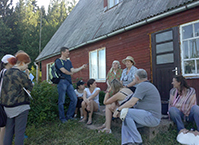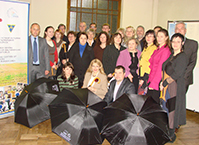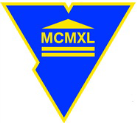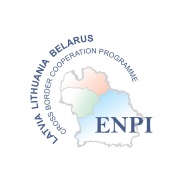Beliefs, old traditions, cooking and making drinks, etc.?
Categories: Holidays and traditions, Regina Bramane
About Christmas. The rooms were cleaned, the icons were decorated, people made roses and used paper to decorate the lamps, Christmas tree was brought and people decorated the tree as they could. In the times of Latvia, my dad bought candlesticks. Everybody melted loja – sheep fat, put together, every year we decided in whose home the play would be staged, we agreed in which house the formal part would take place, we prepared everything themselves. On the first day of Christmas, the neighbourhood children came together, we staged a playlet, learned poems, there was such a play Sapnis saulītē [Dream in the Sunlight], there was a playlet, and a pig and a turkey. People arrived from remote places; everybody had their roles to play. Stass Pūdāns was a turkey. We had staged even the play Sprīdītis [Tom Thumb]. I don’t know about other places, just about our area. In the morning, we went to the church in Kalupe, and to Vārkava. No presents were given. Pies were baked and we could eat as much as we wanted.
The table was laid, hey was put under the tablecloth, a trough was placed because the infant would be born; we’d go celebrate the holiday in the morning. The adults used to tell us that water was sweet at Christmas midnight. We, kids decided to get up to drink and taste it. Then they also said that animals were speaking in the cattle-shed. And we felt like going and listening to them speaking… One horse had said to somebody that it would have to take the man to the cemetery, that man who listened behind the door… Then it seemed better not to go to listen to them speaking.
Līgo [Midsummer night festival] was not particularly celebrated in the times of Latvia. It was more celebrated during the kolkhoz times; in homes where Jānis lived they made fire, made wreaths and sang Līgo songs.
At Easter we had to collect eggs, we gave grains to hens so that adults did not see that, for hens to lay more eggs. Eggs were boiled and distributed, every person got some 3, 4 eggs. In Latvia’s times, my father had bought the egg dye, it was green, rosy, otherwise eggs were dyed in onionskins. The neighbours came and we were tapping eggs.
As to collective work. That was fun – especially carting out dung. Those who carted dung were called carters; there were people who shook dung, and those who distributed the dung in the field (kapačutojs). I remember a year, J.Lazdāns – a man with fine sense of humour – his shirt unfastened, his trousers twisted, and he was singing – a man was ploughing at the edge of a forest, he’d hung his trousers on a birch bough, short shirt, great balls, wind moving his willy... And that song sounded at the edge of the forest. The dung shakers were also singing a song after song; a huge cart was decorated with grass or branches. The one who carted the last cart was called škruba, the shakers sat in the middle, the thrower with his pitchfork, and thus they arrived singing into the yard.
At home, nettles had already been prepared, the shakers and the host got swished with the nettles and after that they began nettling and splashing each other with water. The old men said that the young men were mooing as bulls.
When the rye was harvested, that was a very hard work, when we had finished we were treated to beer. We made wreaths from rye ears for the host and the hostess… The main song was “Zīdi zīdi rudzu vuorpa” [“Bloom, bloom, the rye ear”]. The corn shocks were nicely shocked. Then there already was a reaping-machine, we had to make sheaves. Nobody spoke about money or clothes, people spoke with humour. That was nice and simple. A musician was the most important person, and then people started to dance at once.
or clothes, people spoke with humour. That was nice and simple. A musician was the most important person, and then people started to dance at once.
There were no common potato lifting; people did not plant a lot of potatoes.
Flax pulling was a hard work, much was paid for flax, and pullers went to earn something to buy some new cloth or something else.
That was a great delight for the youth; we went to help each other out.
We were not allowed to go to evening parties (večerinkas), it was said that because we were tearing shoes. We fetched our shoes in hands, but they still did not want us to go. We lied, that the dancing party was not so far, but it actually was behind the forest, we went all together in a crowd; in summers, the dancing parties were held in barns, some lanterns were brought because it was darkish there and one couldn’t see where who was. There were very many people. People from Vārkava came to those dancing parties; they liked girls from Kalupe. A cap on the head, the boots, the trousers loose and speaking Latvian (baltiski). They were brawlers, they were rude, we didn’t like them.
As to the kolkhoz times. Our kolkhoz was “Jaunā dzīve” [“The New Life”], I was the first bookkeeper, I didn’t understand anything, nobody understood anything, then, later Antons Lazdāns helped to draw up the annual report. When in the year 50 I attended the courses, I learned and understood more. Our kolkhoz was merged with Vienība [Unity], and then it was considered one kolkhoz. There were no pregnancy leaves, no annual holidays, we had worked 12 years in that kolkhoz for free; everybody worked like that, and there were no pensions either. Old people died without pension, later the sum was 12 roubles, then 22 roubles. Those who had five children retired at the age of 50, those who didn’t – at the age of 55. There was no money as such.
as such.
When potatoes were lifted in the kolkhoz, you could collect bigger potatoes in a pile, hide them and bring them home in the evening. I was a reckoner, how many working days we earned, somebody earned 35 roubles, another 27 roubles in a year. Having received the money, we had to buy salt, shirts, bread; children went herding, they herded the kolkhoz cows. They had nothing to shoe, they had no rubber boots. If potatoes were lifted when it was cold or wet, the hands froze, it was hard. In October, we pulled flax, if you worked longer – you suffered from cold – the belly was wet and the hands were wet. But in summer, we all together as in a crowd pulled flax during the day but in the evening we had to go and thresh, we had to thresh the winter crops, to bundle them. In the dawn, we were not able to find in which direction our home was.


